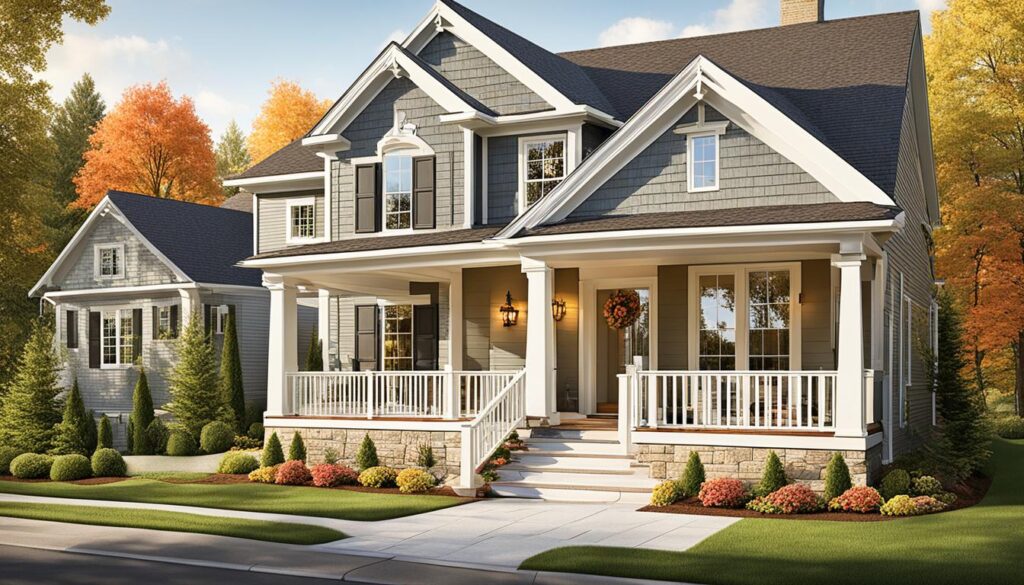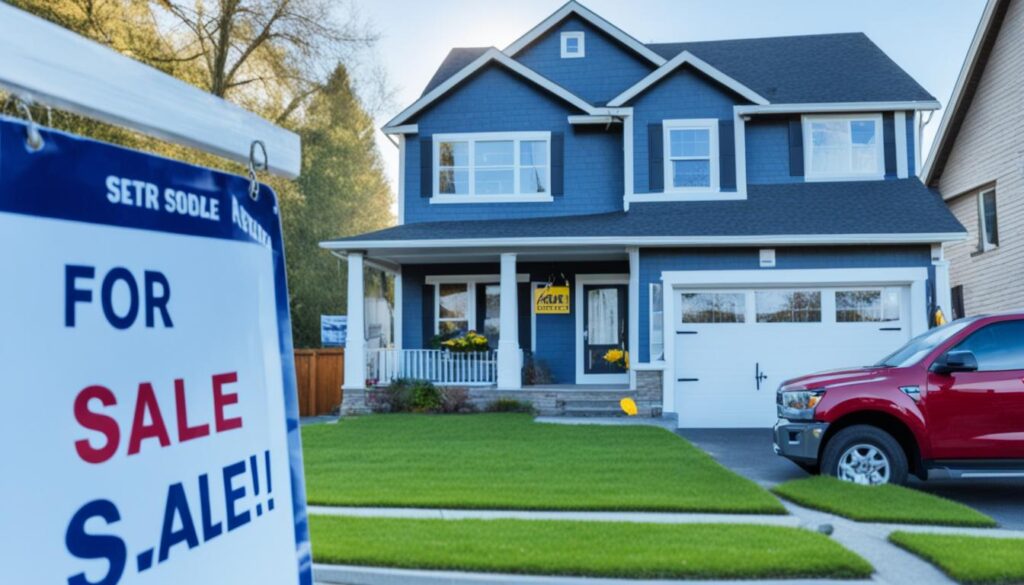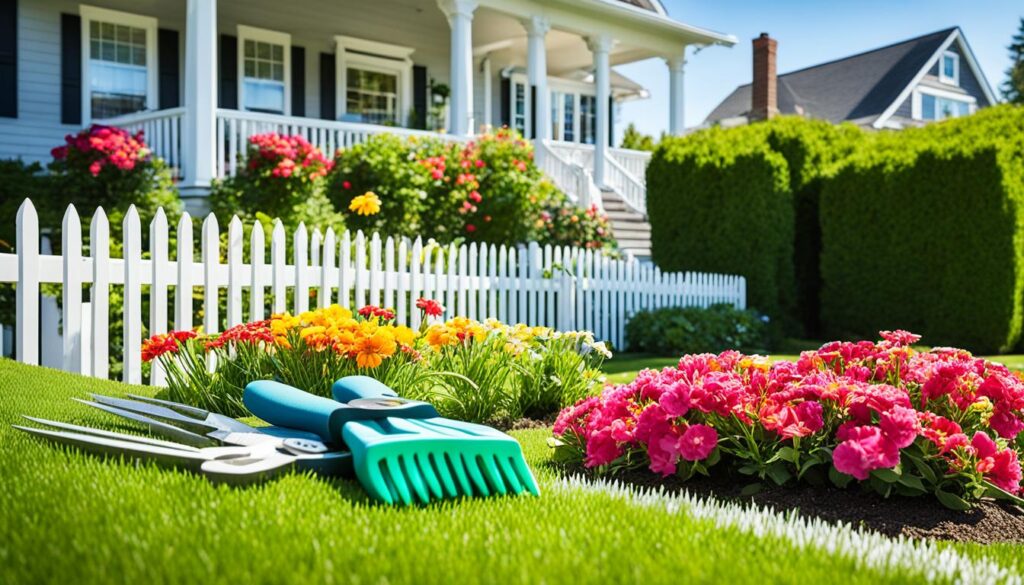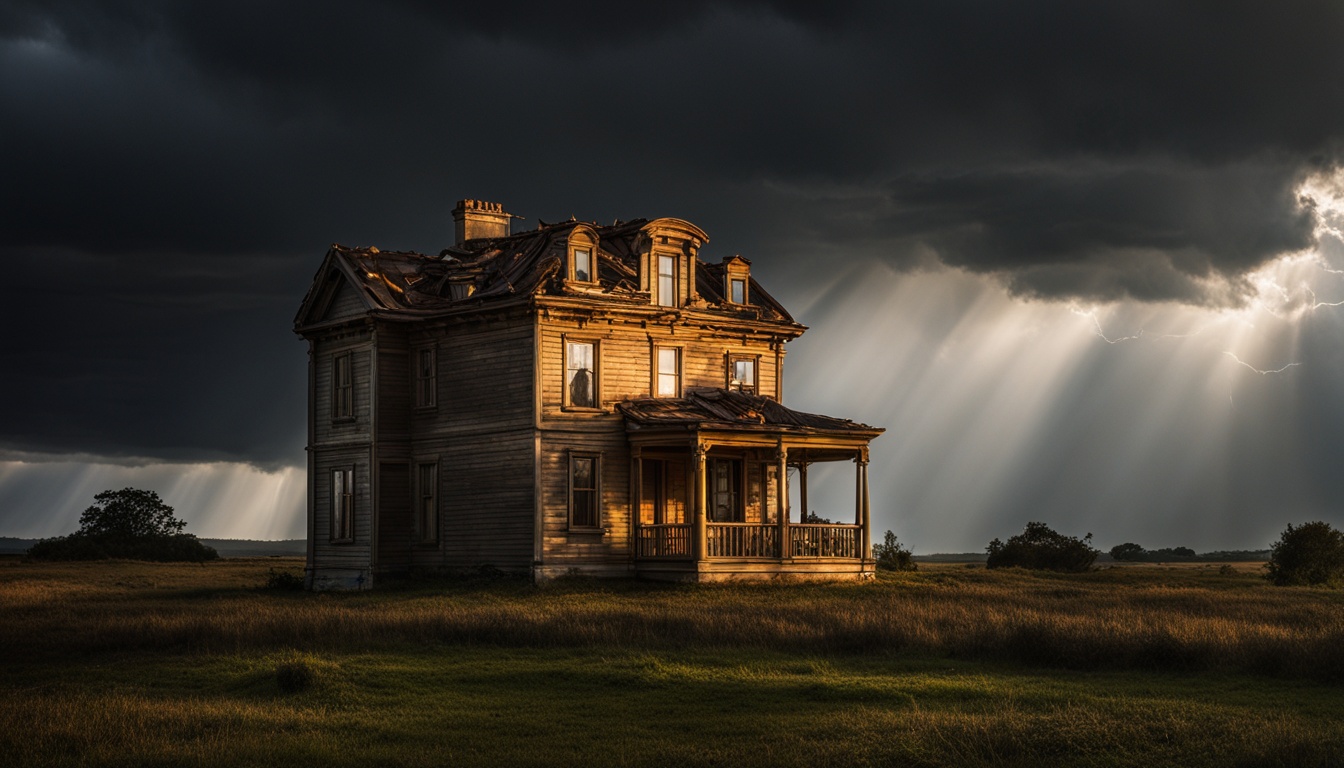I provide top-tier homeowners’ insurance benefits. These include protection for your home, personal items, and liability. This coverage aims to offer peace of mind against various risks.1 Owning a home is a major life investment. Homeowners insurance is key to safeguarding it. It helps pay for repairs or replacements after damage from things like fires or storms.1 It also protects your personal items and structures on your lot. Plus, it covers you if someone gets hurt on your property, or if you damage others’ properties.
Key Takeaways
- Homeowners insurance provides comprehensive coverage for your dwelling, personal belongings, and liability protection.
- The average annual cost of home insurance for $300,000 in dwelling coverage is $2,151 as of April 2024.1
- Factors like location, home condition, and personal history affect homeowners insurance premiums.1
- Discounts are available for bundling policies, installing safety features, and maintaining a claims-free record.2
- Customizing your coverage with endorsements and riders can provide additional protection for valuable items.2
Understanding Homeowners’ Insurance Premiums
Do you know what a homeowners insurance premium is? It’s the money you pay to keep your insurance active. You have options on how to pay. You can pay monthly, every three months, or yearly.3 If you’re still paying off your house, the bank might include your insurance fee in your mortgage. This way, they make sure your insurance bill gets to the right place.
Factors Considered in Calculating Premiums
When you’re getting a new insurance plan for your home, the company looks at many things to set the price. They check your personal details, like any previous claims you’ve made. Depending on your state’s laws, they might also look at your credit score.3
Your house’s qualities also matter. Stuff like where it’s located, its age, size, condition, and how close it is to a fire department are all factored in.3 If your house is newer and you take good care of it, you might get a better deal. But if your home is old, or you’ve had trouble with insuring your home in the past, it could cost more.3 The higher the risk for the insurance company, the more they might charge you.
Average Homeowners Insurance Premium Costs
On average, in the U.S., insuring a house worth $300,000 costs about $2,151 a year. This is according to insurance companies’ data from April 2024.1 Keep in mind, these are just average costs. The final price you pay can be more or less. It depends on your home’s specific details.
Where you live plays a big part in how much you pay. Home insurance prices vary from state to state. States with a lot of storms or high crime see higher costs. The most expensive home insurance states are X, Y, Z, while A, B, C states are more affordable.1
Homeowners’ Insurance Benefits
Homeowners insurance helps cover the costs when your home is damaged. This might happen due to a fire or certain bad weather types.4 It also includes personal property, other structures, and provides liability protection for accidents.4
Dwelling Coverage
The HO-3 policy is common and focuses on the home’s structure.4 It pays for repairs or rebuilding after damage from events like fire, storm or disaster.
Personal Property Protection
Most home insurance includes replacement cost coverage for your things.4 It pays to replace personal items at today’s prices, without depreciating value. So, after your deductible, you could replace a stolen or damaged TV with a new one.
Liability Coverage
Liability protection in homeowners insurance is also important.4 It helps with legal and other costs if you’re responsible for someone’s injuries or property damage.

Comprehensive Protection for Your Home
Additional Living Expenses Coverage
If your home is badly damaged, your insurance can help with living elsewhere during repairs. This includes staying at a hotel or Airbnb. It also covers costs for pet boarding, moving, and storage space rental.5
Natural Disaster Coverage
Home insurance usually protects against fires, storms, and even meteorites. But it might not cover earthquakes and floods. These could need extra policies.5
Personal Belongings Protection
Your policy protects your stuff, and your family’s too, like items of kids at college. Yet, there are limits for things outside your home. For expensive items like jewelry or art, you might need extra coverage.5
Replacement Cost Value vs. Actual Cash Value
In picking your homeowners insurance, deciding between replacement cost value (RCV) and actual cash value (ACV) matters a lot. It affects both your coverage and what you get paid if you need to make a claim.6 RCV lets you replace your lost or damaged stuff with brand new things. ACV, on the other hand, looks at the item’s original cost and then subtracts depreciation to determine your claim’s value.6 RCV is generally more expensive because it offers broader protection than ACV.6 With RCV, homeowners can replace their lost items without paying more from their pockets, unlike ACV.6
7With an RCV policy, you get more extensive coverage but you will pay a higher premium. ACV policies are usually cheaper but your claim checks will be smaller due to depreciation adjustments.7 RCV policies often pay more for claims on items that go up in value, or for special features in older homes.7
8ACV insurance covers your property’s value after taking out depreciation. But with RCV, you’re covered to replace damaged items at 100% of their value.8 Picking RCV can increase your home insurance costs by about 8%. However, some companies, like Erie, might only raise your rates by an average of 2% for RCV coverage.8
Water Damage and Mold Coverage
Being a homeowner means knowing about water damage and mold coverage to safeguard your home. Our policies include water damage coverage for fixing or replacing items hit by sudden accidents, such as a burst pipe. This also covers mold in most cases, if it’s from a problem that’s already covered.
Yet, coverage doesn’t include ongoing water issues or damage from floods.9
Mold Remediation
If mold pops up from a covered accident, your policy might pitch in for the cleanup.9 Long-term mold problems or flooding-induced mold usually have no coverage, though.9 The help for mold cleanup can reach up to $10,000, depending on your policy.10 To bolster your defense against mold, consider extras like water backup insurance.10
Getting rid of mold might cost you between $1,000 and $6,000.10 Look out for signs like smelly, damp air, or health issues. To stop mold, air out your home, keep it dry, and fix leaks quickly.10
For a mold insurance claim, snap photos, and do some cleanup first.10 Coverage hits when it’s from something sudden, like a burst pipe. Always check with your insurer about your policy.10
Insurance could say no if you didn’t maintain your home well, or it was from a flood or backed-up water.10 With a rejected claim, you’re on your own for cleanup or possibly hiring pros.9 Regularly checking your home can stop mold before it becomes a problem.9

Home-Sharing and Rental Coverage
When you rent out your home or a room, a standard homeowners policy might not be enough. You might need to add home-sharing coverage. This can protect you and your guests. Some rental companies and insurers offer special policies for hosts.11
If your policy includes home-sharing, it may not fully cover paying guests. Also, you might have limited protection if you run a home business. For items damaged that belong to others, the coverage is usually minimal, about $1,000.11
Short-term rental policies often have insurance for guest injuries and property damages. This coverage is essential, including theft and burglaries. If you’re listed with Airbnb or others, checking if your current policy is enough can save you from claim issues later.12
Allstate, American Family, and more offer short-term rental insurance. They protect against accidents and property issues. Airbnb and Vrbo, for example, can offer up to $1 million in liability coverage. Choosing the right insurance is crucial, especially if you earn a lot from these services.12
Proper Insurance is a top choice for rental and sharing coverage. This includes up to $10,000 for theft and property damage. Adding this coverage may raise your premium by 30 to 50%. But, with hosts making more than $50,000 yearly, it’s a smart investment.13
Switching Homeowners Insurance Providers
The process of changing homeowners insurance can be simple, but be sure to have your new policy set up before you cancel the old one.14 A recent survey shows that only 13% of homeowners changed insurance last year to save money.14 However, many people faced higher premiums from 2022 to 2023. In some places, costs rose over 30%.
It’s wise to inform your mortgage servicer early if you’re planning to switch insurers. Once you’ve picked a new policy, let them know. You can switch house insurers whenever you like, even if you have a claim open.
In looking for a new policy, compare quotes from three or more companies. This way, you won’t miss out on better deals or coverage options.14 A specialist from Policygenius can assist you in getting a new policy and ending the old one.
15 It’s crucial to check your policy every couple of years. Your costs or coverage needs might have changed.15 And don’t forget to see what other customers think, look at ratings for service quality.15 Also, ratings for a company’s financial strength can show if they can pay claims.
15 When comparing plans, make sure to look at what’s covered, what’s not, and any extra protections offered. Home replacement costs have gone up 55% since 2020.15 This makes it vital to review your coverage for things like computers or jewelry. Ensure your home has good fire safety systems too.
15 To get quotes for home insurance, you’ll need to share personal details like your name and address. Also, details about your home, like its security and unique features, can help get an accurate quote.15 This preparation makes the quoting process smoother.

Discounts and Savings Opportunities
As a homeowner, you have access to discounts that will reduce your homeowners insurance costs. Utilizing these can provide extensive coverage at lower costs. Let’s look into several key discount opportunities for you.
Bundling Discounts
Bundling your homeowners insurance with your auto insurance helps you save. By having both with one provider, you might get up to a 10% discount.16 This makes managing your insurance easier, saving you real money.
Home Security System Discounts
Having a monitored security system can cut your insurance costs by up to 5%.17 It shows you’re serious about keeping your home safe, which insurers appreciate. Also, using smart home devices can earn you even more discounts through specific programs.17
Claims-Free Discounts
Staying free of claims for three to five years entitles you to a big discount, up to 15%.18 This encourages smart maintenance of your home, lowering the insurer’s risks.
You can make the most of these discounts to save a lot on your homeowners insurance. This way, you ensure your home stays well-protected without overspending.
Customizing Your Homeowners Insurance
Being a homeowner means you can adjust your insurance to fit your needs. It’s important to look into endorsements and riders. You should also think about raising your coverage limits.
Endorsements and Riders
The VPP policy gives extra coverage for items such as jewelry and cameras without a deductible.19 For things that are really valuable, you might need endorsements or riders. These add-ons increase your policy’s limits for high-cost items.
Increasing Coverage Limits
Make sure your house is insured for its rebuilding cost, not what it might sell for.19 The coverage might be more or less than what the house is worth. This depends on where it’s located and the rebuilding costs. Also, check what personal items you need to cover. And think about raising your liability coverage.

Risk Mitigation and Preventive Measures
Making your home safe is crucial for every homeowner. By taking steps to keep it in good condition and adding safety features, you protect your largest investment. This might also lower what you pay for home insurance. Checking and fixing your roof, windows, and doors often is important. It helps reduce damage from natural disasters. Also, adding storm-proof windows, sturdy doors, and a roof that can take impacts makes your home safer.
Home Maintenance
Taking care of your house can prevent big, costly problems. Regular tasks like cleaning gutters, looking at the foundation, and keeping the HVAC working well are key. A managed home has fewer surprises that could end in insurance claims.
Safety Features
Home security and fire alarms make your family safer. They also make your insurance cheaper. By having a monitored alarm that catches smoke, leaks, and break-ins, you could get a discount of up to 5%. Plus, these features lower the risk of big losses, helping you save on insurance in the long run.

Homeowners’ Insurance Benefits
Homeowners insurance helps if your home is damaged by things like fire or storms. It pays to fix or replace your house. This insurance also covers what’s inside your home.
It helps you with extra costs if you can’t live at home while it’s fixed. Also, it protects you from paying too much if someone gets hurt at your home.4
If something big happens, like a fire, or a tree falls on your house, you’re covered. But, it doesn’t cover everything. For example, earthquakes or floods need a different insurance policy.20
Conclusion
As a homeowner, I’m excited to bring you the best homeowners’ insurance benefits. It keeps your home safe, your stuff protected, and you safe from being sued with comprehensive coverage.21 Understanding what your insurance offers is key. Know about premiums, coverage, and how you can make it perfect for you.21 Also, keeping your home in good shape and adding safety stuff can lower your costs21. This means more peace of mind and maybe even savings on your insurance rate.
Pick our plan to protect your home, what’s inside it, and yourself from trouble.22 Learn the fine print of homeowners insurance. This includes what’s covered for repairs, water damage, and rules for renting your place out.23 Getting discounts for bundling other insurance, using smart home tech, or not having recent claims can lower your costs21.
Taking the right step with your insurance now will make sure your home and family are safe.21 Be informed and do things to prevent problems. This way, you can relax knowing you have good coverage and security.
FAQ
What is a Homeowners Insurance Premium?
What factors are considered in calculating homeowners insurance premiums?
What is the average cost of homeowners insurance in the U.S.?
What does homeowners insurance cover?
What is replacement cost coverage?
What is liability coverage in homeowners insurance?
What is additional living expenses coverage?
What natural disasters are typically covered by homeowners insurance?
What is the difference between replacement cost value and actual cash value?
What is covered under water damage and mold coverage?
What additional coverage do I need for home-sharing or rental income?
How do I switch homeowners insurance providers?
What discounts are available for homeowners insurance?
How can I customize my homeowners insurance policy?
What home maintenance and safety features can help lower my homeowners insurance premium?
Source Links
- https://www.bankrate.com/insurance/homeowners-insurance/what-is-a-homeowners-insurance-premium/
- https://www.usaa.com/inet/wc/insurance_home_condo
- https://www.investopedia.com/insurance/homeowners-insurance-guide/
- https://www.usnews.com/insurance/homeowners-insurance/what-does-homeowners-insurance-cover
- https://www.iii.org/article/what-covered-standard-homeowners-policy
- https://www.nerdwallet.com/article/insurance/actual-cash-value-vs-replacement-cost
- https://www.policygenius.com/homeowners-insurance/actual-cash-value-vs-replacement-cost/
- https://www.forbes.com/advisor/homeowners-insurance/replacement-cost-vs-actual-cash-value/
- https://www.nerdwallet.com/article/insurance/does-homeowners-insurance-cover-mold
- https://www.usnews.com/insurance/homeowners-insurance/when-does-homeowners-insurance-cover-mold
- https://content.naic.org/article/consumer-insight-renting-out-your-home-you-need-insurance-coverage-home-sharing-rentals
- https://www.forbes.com/advisor/homeowners-insurance/home-sharing-insurance/
- https://www.proper.insure/home-sharing-insurance/
- https://www.policygenius.com/homeowners-insurance/how-to-switch-homeowners-insurance-companies/
- https://www.bankrate.com/insurance/homeowners-insurance/changing-homeowners-insurance/
- https://www.forbes.com/advisor/homeowners-insurance/find-discounts/
- https://www.policygenius.com/homeowners-insurance/homeowners-insurance-discounts/
- https://www.nerdwallet.com/article/insurance/home-insurance-discounts
- https://www.amfam.com/resources/articles/understanding-insurance/customize-your-homeowners-insurance-policy
- https://content.naic.org/cipr-topics/homeowners-insurance
- https://www.travelers.com/resources/home/insuring/do-i-need-homeowners-insurance-and-when-should-i-buy-it
- https://www.kiplinger.com/personal-finance/home-insurance/do-you-need-home-insurance
- https://roughnotes.com/homeowners-policies-the-conclusion/
